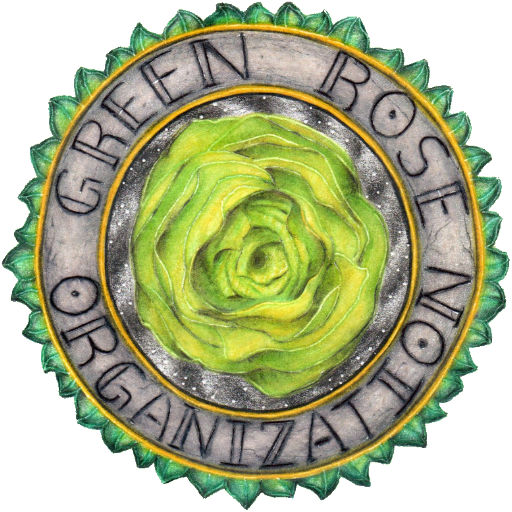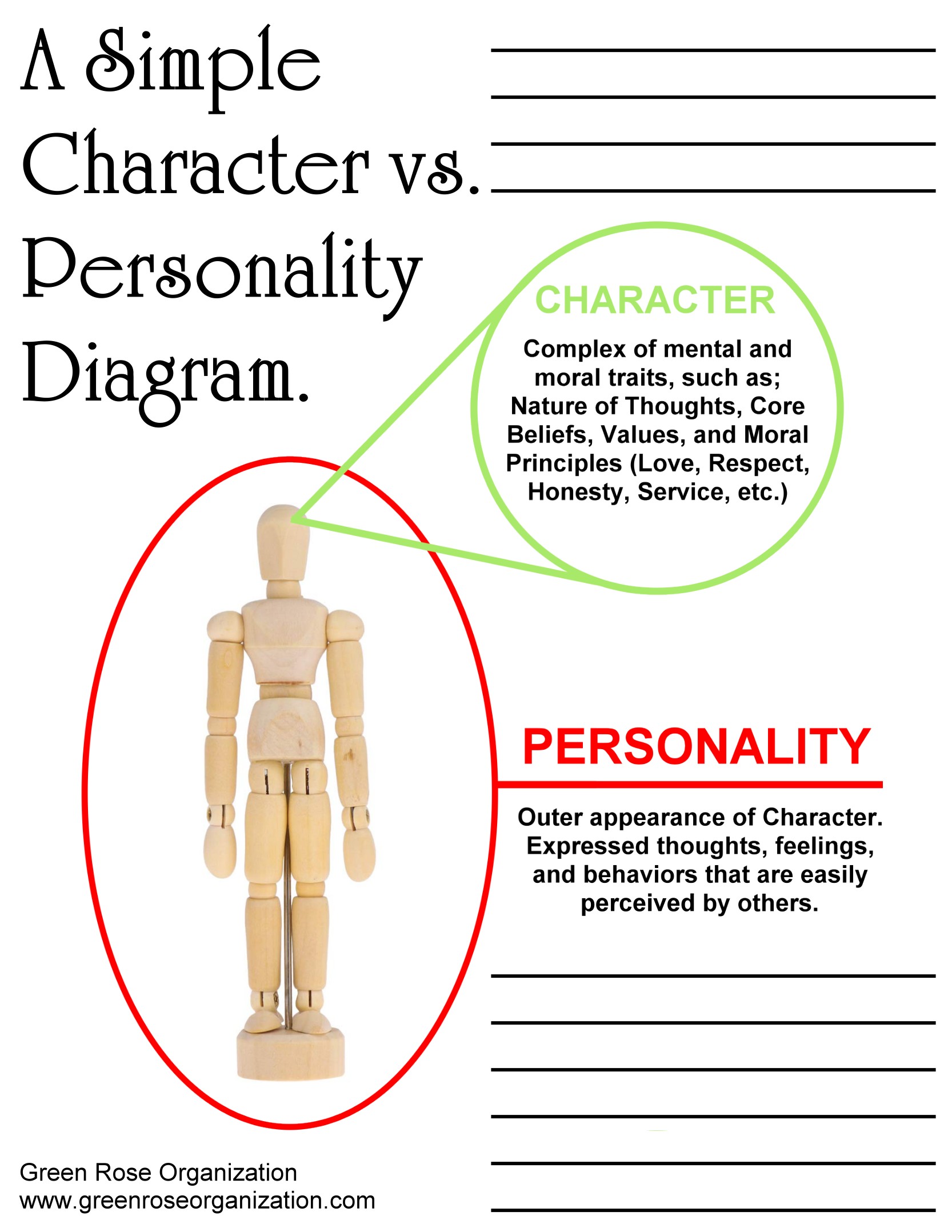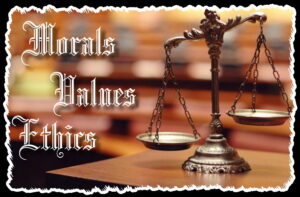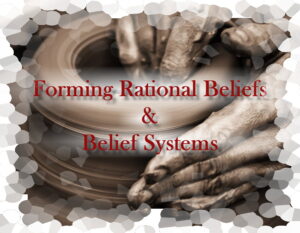COMPARING CHARACTER VS PERSONALITY
by Shawn Malzahn
If a man or woman’s Character represents the sum total of his or her mental and moral traits fashioned by the patterns of his or her own thinking; then what does the word Personality mean when we use it? Usually the two terms are used synonymously, which unfortunately disempowers us because we are essentially turning two separate words into one word. This is disempowering because it removes a word from our vocabulary that could have been used to communicate yet another subtle layer of our individual nature. It is very important for us to have many different words to describe as many aspects of ourselves as possible. This is true because these words help us pay attention to things about ourselves that we probably didn’t even know existed, and once aware of these “microscopic personal details”, we can then take conscious control of them according to the whims of our will, as opposed to just letting them continue to exist; playing out like some type of automatic program on repeat. Thus this lesson will serve to empower us by adding yet another term to our self-improvement vocabulary. We will do this by making a clear distinction between the terms Character and Personality, then take a deeper look into the nature of Personality, and finally wrap things up by briefly introducing some of the Personality Refinement topics that will be covered in future lessons.
In order to help make a clear distinction between Character and Personality, it may be helpful if we explore some of the stock definitions of Personality that have been recorded throughout the years of past. Before we do though, I would like for you to briefly consider what the word Personality means to you. What comes to mind when you hear the word Personality? Personality has been defined in several different ways over the course of many years. In the late 14th century we find Personality defined as, “a quality or fact of being a person”, and in 1795 as, “a distinctive essential character or mark of a self-conscious being”, and finally in 1889, we see Personality defined as, “a person whose character stands out from that of others''. All this implies Personality having something to do with Character, yes, but also being something very specific and different; something to do with being a “person”, something to do with being “self-aware”, and something to do with “standing out from others”. So what does it mean to be a person? Well quite literally it means to be an individual, and to be an individual means that we must possess a sense of self, or essentially a self-identity that we intentionally assume (and perpetuate) in order to stand out as an individual. So what is this “self-identity”, and what is it made of? Self-identity is essentially how we perceive ourselves; it’s the image of ourselves that we hold inside our minds that affects how we feel and behave in relation to our experiences in life. Specifically, our self-identity (or self-image) is just a bunch of core beliefs revolving around what we THINK our qualities, abilities, and potentialities are as an individual, especially in relation to society (specifically other people). Now this is where Personality begins to deviate from Character, because Character, as we know, has to do mostly with morality, conscience, being a good person for the sake of harmony and growth, with and within, Nature and society, whereas Personality has more to do with how we see ourselves as an individual operating in those environments, as well as how others perceive us doing that. Character is something deep in our psychology, something long-lasting and not easily perceived by others. Personality is on the surface of our psychology, something that changes often and quickly so as to adapt and/or fit into our social circles. Character is more inline with what we are, as opposed to Personality, which is more inline with what we THINK that we are, and/or wish to be for whatever reasons. Another way of looking at Personality is to see it as our “outerwear”, or “mask”, because it’s something that we change frequently as we move from act to act in this Divine Play called Life. In fact, the word Personality has its roots in the Latin term “persona”, which literally means mask, and even deeper roots in the Greek word “prósōpon”, which means “face, appearance, and/or mask used in ancient theater to denote a specific character, or more generally speaking, a social role assumed by an individual”. Thus from here on out, whenever we make mention of the word Personality, we are indeed referring to the outer appearances, or reflections of one's Character, and not Character itself.
If we wish to begin taking a deeper look into the nature of Personality, we must continue to remember our working definition of Character as laid out in the previous lesson. Character, as we stated before, is the “mental and moral traits of man fashioned by his own thinking in relation to his experiences'', and if Personality is a reflection of Character, then we can rightly say that the quality and condition of one's Personality is predominantly determined by the quality and condition of his or her Character (weather good or bad). Thus if someone's Character is full of irrational beliefs, unrealistic expectations, and vicious qualities, such as; Hate, Lust, Greed, Envy, etc. then we can reasonably expect that this person’s Personality will be that of a highly opinionated, entitled, and likely delusional sort that reflects violent, highly sexual, addiction forming, and selfish behavious, since these traits all coincide with the aforementioned Character qualities and conditions. However, even though this Personality (or mask) will naturally be formulated over time (if such a Character be present), it should also be noted that, unlike Character, Personalities can be easily and intentionally changed, manipulated, and disguised in order to fool and/or adjust to one’s social situations. For example, although someone’s Character be full of Hate, they can still easily pretend to be Loving for the sake of avoiding conflict with others. Kind of like when we see people in customer service positions being kind and courteous to those they service, only to turn around afterward cussing and complaining about how much they hate people. Sound familiar? Thus we can see Personality as a kind of “social tool” that we use to effectively get by in our day to day interactions with others. Knowing this, we are empowered with the knowledge that just because someone comes off a certain way upon first meeting them (whether good, bad, or indifferent), doesn’t necessarily mean anything as far as helping us to truly understand who, or what, this person is “all about”. We must learn to be patient, observant, and open-minded when dealing with others if we wish to honestly discern their Characters, for over time, their Characters will eventually “bleed through” their Personalities, exposing the truth about who they really are at the core of their Character.
If Personality is to be perceived as a reflection of our Character, then what does your Personality say about your Character right now? Take some time to think about this, what do your present ways of thinking, feeling, and behaving say about the contents of your Character? This type of self-inquiry will give us some insight as to where we need to be focusing our attention throughout the remainder of this Character Enrichment Course. Also, if Personality is to be perceived as a “mask”, and/or “tool”, that we use intentionally to effectively adapt to our social environments, then I would like for us to spend some time thinking about all the various ways in which we consciously manipulate ourselves when interacting with other people. Specifically, I want us to figure out how those various masks that we transition through on a daily basis affect the ways in which other people feel; are we hurting or harming other people for the sake of our own social adaptation and advancement? Or are we helping them to feel good inside themselves while adapting and advancing alongside with us? Take some time now to consider this question. Do your various Personality styles hurt more as opposed to help others? If we find that we are indeed causing more harm than good, then perhaps we should begin trying on new masks! Once we get to the Personality Refinement Course of this ongoing Self-Improvement Workshop, we will be introduced to something which I call, the “Relationship Oriented Leadership Personality Style”, or essentially, the “Universal Mask”, that will help us adjust to just about any social situation and/or circumstance without causing much harm to those involved in our daily interactions. In fact, I propose that this Universal Mask will not only help us to integrate safely and effectively within society, but it will also help us to begin reforming our Characters over time, due to the virtuous qualities and characteristics that will naturally be developed, through the use of the specific techniques and methods required to uphold and wear this mask, namely that of communication, organization, relation, and leadership skills.
Now that we have made a clear distinction between the terms Character and Personality, peered deeper into the nature of Personality, and briefly introduced the Universal Mask that we will be trying on in a future course; I would like to conclude this lesson by quickly summarizing what we have learned about Personality in general. Personality is a reflection of Character, and NOT Character itself. Personality has more to do with how we see ourselves as an individual operating in our various environments, as well as how others perceive us doing that. Personality is more inline with what we THINK that we are, and/or wish to be, as opposed to what we actually are. Personalities can be easily and intentionally changed, manipulated, and disguised in order to fool and/or adjust to one’s social situations, therefore it can be seen as some type of psychological tool that we use on a daily basis. Personality is generally on the surface layers of our psychology and therefore can be seen as our “outerwear”, or “mask”, because it’s something that we change frequently as we move from act to act in this Divine Play called Life.




